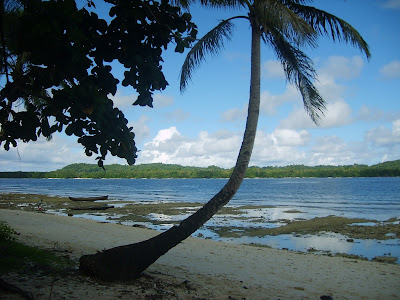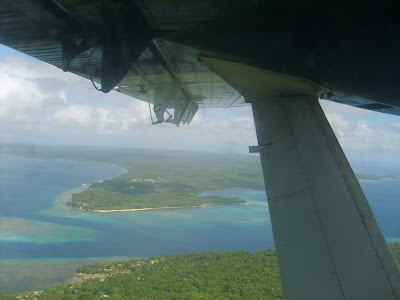For my MA in Anthropology at CSULB, I conducted fieldwork in the Solomon Islands for one summer. I was in the Solomons for about 10 weeks and in one village for about 6 and other parts of the island for 2 more weeks. This was enough time to gather information to write an MA thesis, but it also left a lot of holes in my research. Five years later as I am trying to reexamine my data not only do I see holes in my research, but holes in my documentation and analysis procedures. With this in mind, here are some lessons I have learned and suggestions for future fieldwork, so that others don't make the same mistakes.
While in the Field:
1. Set aside time daily to write up your notes. As a good anthropologist should, I carried around a small notebook for jottings. In the beginning I was good about writing things in detail in a separate notebook, but toward the end of my time, I became more sloppy and less detailed. Now years later, I wish a few more days had more details and information written down!
2. Write down all the details! Write the location, what you see, what you hear. You think you will remember this, but years later you won't. It might seem mundane now, but later on you will wish you had this information! But at the same time, don't let too many details make you get behind on daily documentation, so when necessary just write the essentials in detail.
3. Make a genealogy. Even if kinship is not your main goal, genealogies can help you later on understand the family relationships in the community. Until you start analyzing you might not realize what information is important. This can also apply to people studying organizations, documenting names, job titles and relationships is very important and one of the things that is hard to remember later on.
4. Don't be afraid to ask questions, even if they are awkward. Of course, respecting your hosts and the culture is very important and that should always come first in your interviewing, but sometimes it is okay to push a little. For example, when I was in the village, one couple got into a big verbal and physical fight halfway through my research. They had been some of my key informants, but I didn't do a formal interview with either of them until the end of my time. Because of the tensions still lingering, I just interviewed the husband. When I came to questions about his wife, I skipped them because it seemed too awkward. Looking back, I should have at least phrased the questions differently and still asked, they weren't offensive or related to their argument... now these missing details are important to my analysis... I thought I had this information recorded in an informal interview with her, but I can't find it... which ties back to #1 & #2!!
5. After being in the field for awhile, take a break to analyze your information. Spend time typing up information from your interviews, writing down questions that still need to be answered and formulating preliminary analysis. Make a plan of how you will reach your remaining goals and who you need to talk to. Unfortunately for me, I only had 6 weeks and most of my analysis happened once I returned to the US. I wish I could have had some time after I conducted all my formal interviews to do preliminary analysis and then follow up.
6. Give yourself plenty of time and break your time into achievable goals such as: Month 1: get to know the village, culture, and community. Make initial maps of the village and genealogies. Casually ask questions from your formal interviews to see if they are correct. Do lots of observations and write down lots of details. Give yourself a few days to process this information and formulate solid interview questions then... Month 2: Begin conducting formal interviews. Continue to do detailed observations. If possible, write notes and transcribe interviews right away. After you finish your formal interviews, give yourself a couple weeks to analyze the data. Formulate more questions that need to be followed up on, follow up on interviews, etc. Wash and Repeat...
This is not a scientifically proven plan since most research is longer than a few months, but the principles still apply. Write down lots of detailed notes from observations and interviews and give yourself time to analyze the findings and then proceed forward filling in gaps.
7. Return to your site more than once. If you are lucky enough to be doing research in a location you can leave and come back to without being a financial burden, then return to your site again after having a few months to begin writing, because questions will inevitably arise. Being able to follow up once you are writing and share your initial findings will make your work stronger and will be an encouragement to the community that you are doing something with your work and that they are still important to you. Similarly, if possible, do pre-fieldwork research to help you formulate your initial research plans.
These are just a few of the things that have come to mind in the last few weeks. I'm sure more will follow. Fellow anthropologists out there, I'd love to hear some of your lessons learned!





No comments:
Post a Comment